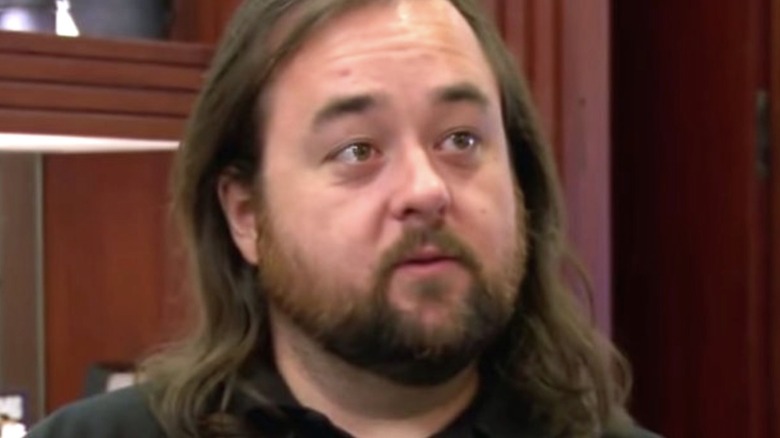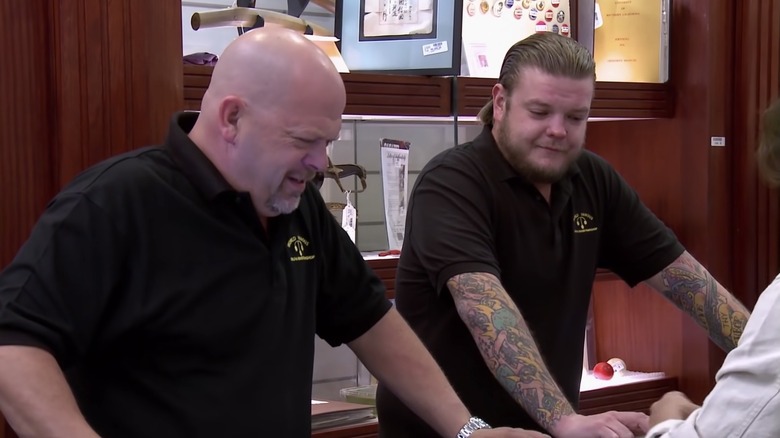This Is Why The Police Are Involved In Every Pawn Stars Transaction
Pawn Stars has long generated a winning mix of content in its combination of historical trivia and family shenanigans focused on the three generations of the Harrison family alongside employees like Austin "Chumlee" Russell. Since 2010, fans have tuned in to make this business a pop culture icon and a welcome fixture on History Channel's reality lineup. The show attracts a huge number of loyal fans, all of whom tune in regularly to enjoy the challenges of a pawn shop in Sin City and the character-driven drama that comes with it. But, as it turns out, filming at a pawn shop has its own unique restrictions, and the cast has to follow several specific rules.
It's long been known that the show has to fake some things. For example, due to privacy concerns, the shop actually has to close when filming, with its main stars unable to work the counter during public hours, via The Huffington Post. Customers get booted from the store when cameras start to roll, which sometimes interrupts and upsets business. Also, it's common knowledge that Pawn Stars is staged (as most reality TV is these days). Show segments are crafted when sellers come in with an interesting or expensive item and then get coached for the filming of negotiations, the Las Vegas Review-Journal has reported.
In addition to that, as it turns out, the police must be involved with all the sales happening at Gold & Silver Pawn Shop. Here's why.
Many laws govern the workings of pawn shops
Federal, state, and local laws govern everything citizens do, of course. And in the case of pawn shops, those laws may be more restrictive than most people know. That's in part because, while there's no research consensus on the role pawn shops actually play as a market for stolen goods, some studies indicate that up to 42 percent of burglars used pawn shops to dispose of merchandise.
According to Nevada law, pawn shop brokers must record every transaction and also write down a "general description of the complexion, color of hair and facial appearance of the person with whom the transaction is had."
On a federal level, pawn shops are regulated by the Patriot Act, the Truth in Lending Act, the Equal Credit Opportunity Act, and the Federal Trade Commission's Data Privacy and Safeguard laws regarding consumer information. There are around 13 federal laws that require pawn shops to report buyers and sellers to law enforcement authorities.
"Most people don't realize how regulated the pawn industry is, especially where I'm at in Nevada," Rick Harrison told NPR's Fresh Air. "When I take something in pawn or I buy something, I just don't take [an] ID. I take their driver's license number, their height, their weight, their eye color, their build. I turn that into the local police department, and then I also turn it into Homeland Security. It's part of the Patriot Act, and that goes to a central database online across the United States that checks for stolen items."
And yes, Harrison has discovered in the past that he bought stolen merchandise. He detailed to NPR one transaction in which he paid $40,000 for a pair of diamond earrings, only to discover the following day that they were stolen. The criminal was prosecuted and the victim got her merchandise back, but he lost that money. "It's the cost of doing business," Harrison says. "That's the way I look at it ... And Las Vegas is a crazy town at times."
Of course, that's one of the reasons why fans will keep watching.

